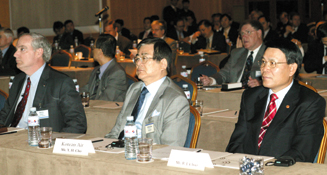KAL's E-Ticket Service
- Int'l forum on flight safety was held
 Korean Air (KAL) has launched an e-Ticket service for international flights on the heels of the on-line ticket service for domestic flights the national flag-carrier introduced for the first time in Korea.
Korean Air (KAL) has launched an e-Ticket service for international flights on the heels of the on-line ticket service for domestic flights the national flag-carrier introduced for the first time in Korea.
The e-Ticket service for domestic flights that was put into practice in June 2003 for the first time in Korea has been offered on the database for air flights KAL has already operated unlike its rival airline using a foreign database in order to handle information on clients' travel desires and provide differentiating travel services tailored to the diverse demands of clients. The e-Ticket service will be put into practice in a full-fledged manner except some foreign airports and international flight routes where facilities need to be augmented or be replaced with new upgraded systems. The latest action has raised to 95 percent the e-Ticket handling rate, heralding an era of e-Ticket on both domestic and international routes. The strong points of the e-Ticket service are convenience, time and cost reduction.
In the past, passengers suffered inconvenience by requiring passengers to purchase paper tickets from ticketing offices or travel agency officers in the town after making reservations, and replacing them with boarding passes. From now on, passengers who have finished reservations and payments can get boarding passes at the airports when they present identification cards or reservation numbers.
Int'l forum on flight safety
An international forum on the safety of international air flights was held April 25-27 at Incheon Hyatt Regency Hotel with about 250 people from the domestic and international aviation-related government agencies, organizations and academic circles participating. The participants included Minister of Construction and Transportation Choo Byung-jik, KAL Chairman Cho Yang-ho, P&W President Steve Heath. Also present at the forum, Korea's largest gathering on aviation and flight were experts and policymakers from such institutions as the National Transportation Safety Board, ICAO, EASA and the Civil Aviation Safety Authority under the umbrella of MOCT. nw
3Fl, 292-47, Shindang 6-dong, Chung-gu, Seoul, Korea 100-456
Tel : 82-2-2235-6114 / Fax : 82-2-2235-0799